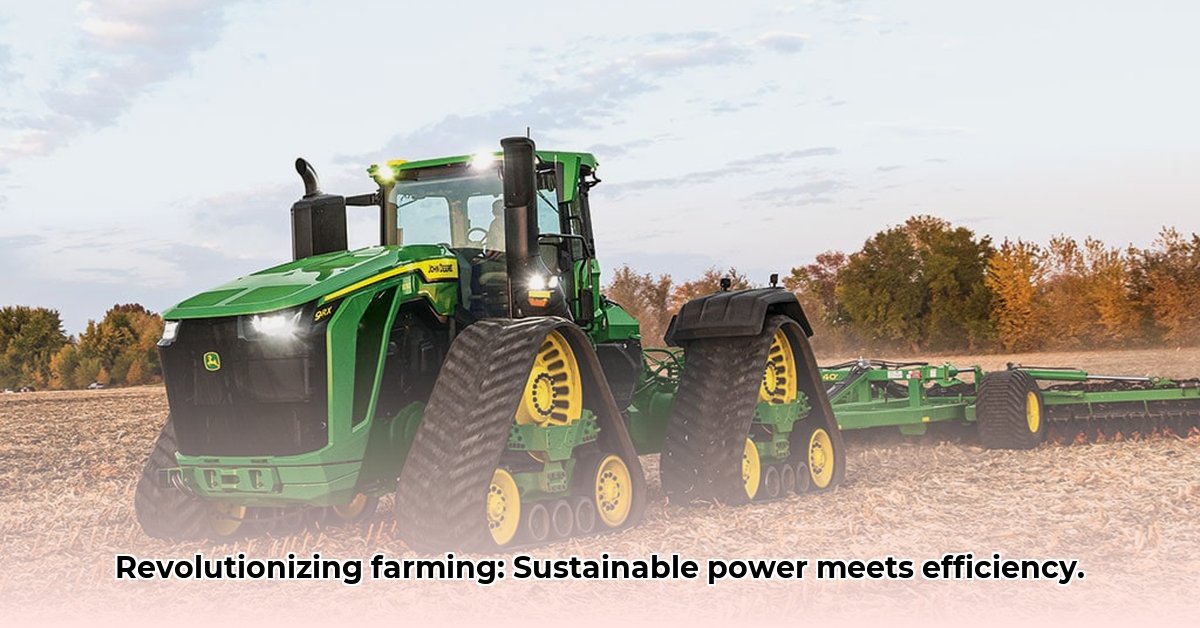
Big farms require big machines. John Deere's articulated tractors, particularly the 9 Series, are powerful tools capable of significantly increasing farm output. However, the sustainability implications of these high-horsepower machines warrant careful consideration. This article analyzes the benefits and drawbacks of using high-horsepower tractors, exploring their fuel efficiency, environmental impact, and overall contribution to sustainable agriculture. For more information on John Deere track tractors, see this page.
The Power and the Promise: High-Horsepower Tractors in Modern Agriculture
The demand for increased agricultural output drives the adoption of larger, more powerful machinery. John Deere's articulated tractors are designed to meet this demand, enabling faster planting and harvesting, potentially leading to significantly larger harvests. The promise is simple: more work done in less time. However, this efficiency gain needs to be weighed against potential environmental consequences.
Efficiency Gains: A Critical Examination
While John Deere marketing materials highlight impressive performance and speed, a critical analysis requires concrete data on fuel efficiency per acre. Claims of improved efficiency need to be supported by independent studies comparing fuel consumption per acre cultivated across different tractor sizes and operational conditions. A lack of readily available, standardized data comparing fuel efficiency per acre cultivated between high-horsepower and smaller tractors currently hinders a comprehensive assessment. How much fuel is actually saved per acre by utilizing high-horsepower tractors remains an open question requiring further investigation.
The Sustainability Tightrope: Balancing Productivity and Environmental Impact
The increased productivity offered by high-horsepower articulated tractors must be weighed against their potential environmental impact. Higher horsepower generally equates to higher fuel consumption, resulting in increased greenhouse gas emissions. Furthermore, the weight of these machines poses a risk of soil compaction, potentially damaging long-term soil health and fertility. The question remains: do the productivity benefits outweigh the environmental costs?
The Tech Factor: Precision Agriculture and Mitigation Strategies
Precision agriculture technologies offer a potential solution to mitigate the environmental impact of high-horsepower tractors. GPS guidance, automated controls, and variable rate application systems can significantly reduce resource waste and optimize input use. However, these technologies come at a cost, both financially (high initial investment) and technologically (requiring expertise and robust data management). Their effectiveness also depends on proper implementation and ongoing maintenance.
Alternative Approaches: Used Tractors and Sustainable Practices
For smaller farms, purchasing used articulated tractors may seem an economically attractive option. However, this carries risks. Thorough inspection and verification of the equipment's maintenance history are crucial. A poorly maintained used tractor might prove less fuel-efficient and require expensive repairs. Careful consideration of lifecycle costs, including potential maintenance and repair expenses, is essential. Moreover, adopting sustainable farming practices (crop rotation, cover crops, reduced tillage) can help mitigate the negative environmental effects of even high-horsepower equipment.
Practical Steps Towards Sustainable High-Horsepower Tractor Use
Achieving sustainable farming with high-horsepower equipment requires a collaborative effort involving farmers, manufacturers, policymakers, and researchers. Key actionable steps include:
Independent Fuel Efficiency Assessments: Farmers should conduct independent assessments of their tractors' fuel consumption per acre cultivated to understand their actual efficiency. This should not rely solely on manufacturer claims.
Alternative Fuel Exploration: Investigating the feasibility of transitioning to alternative fuels (e.g., biodiesel, hydrogen) is crucial for long-term sustainability.
Precision Agriculture Implementation: Farmers should maximize their investment in and application of precision agriculture technologies to minimize resource waste and optimize input use.
Rigorous Soil Health Monitoring: Regular soil testing and analysis is essential to prevent compaction and monitor soil health.
The Road Ahead: A Collaborative Path to Sustainable Agriculture
Can high-horsepower tractors like John Deere articulated tractors contribute to a sustainable agricultural future? The answer is nuanced. The focus should not be on rejecting powerful machines, but rather on responsible use within a broader strategy for sustainability. A collaborative effort, involving manufacturers committed to developing more fuel-efficient and environmentally conscious equipment, farmers implementing best practices, and policymakers enacting supportive regulations, is essential to finding a balance between productivity and environmental stewardship. This necessitates continued innovation and a shared dedication to responsible farming practices to shape the future of agriculture.
Key Takeaways:
- Fuel efficiency depends on factors beyond horsepower, including matching equipment to task and effective field management.
- Precision agriculture technologies significantly reduce fuel consumption and optimize resource use, mitigating environmental impact.
- Transparency in fuel efficiency reporting from manufacturers is crucial for informed decision-making by farmers.
- Independent research and standardized testing protocols are necessary to generate reliable data for comparative analysis.